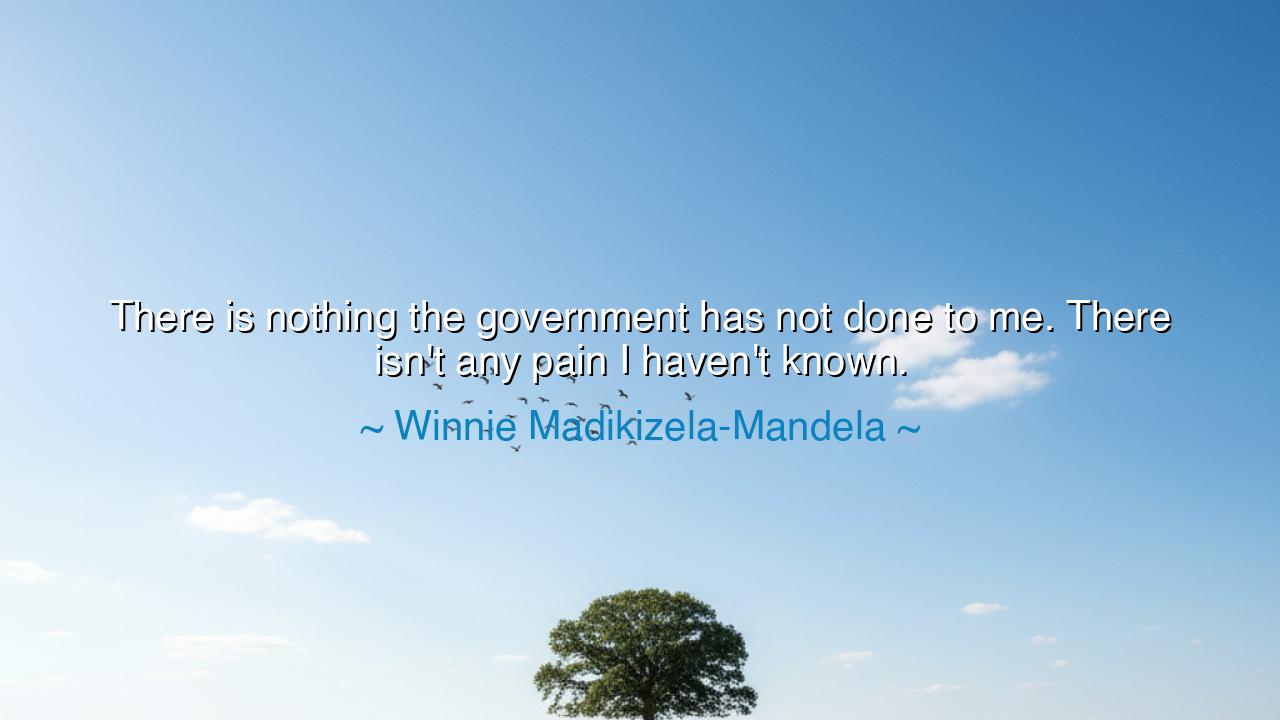
There is nothing the government has not done to me. There isn't
There is nothing the government has not done to me. There isn't any pain I haven't known.






In the furnace of oppression, beneath the heavy shadow of apartheid, a voice rose that would not be broken. It was the voice of Winnie Madikizela-Mandela, the Mother of the South African Nation, who declared in sorrow and defiance:
"There is nothing the government has not done to me. There isn't any pain I haven't known."
These words were not born from weakness, but from fire — the fire of endurance that comes only from a soul that has walked through every form of suffering and refused to yield. In them lives both the personal anguish of a woman and the collective pain of a people. For Winnie, these words were not metaphor — they were testimony. The government she spoke of was not a distant abstraction but a force that had invaded her home, torn apart her family, imprisoned her husband for twenty-seven years, and sought to crush her spirit through exile, surveillance, and slander. Yet from this crucible of torment arose a woman unbroken — fierce, unbending, and resolute.
The meaning of her words reaches beyond the boundaries of South Africa, echoing through the ages as the eternal cry of those who suffer for justice. When she says there is “no pain she hasn’t known,” she speaks not only of physical torment but of the deeper agony of being denied humanity — the pain of isolation, the pain of watching one’s people brutalized, the pain of enduring injustice while standing powerless before it. Yet within her suffering lies an unspoken truth: that the measure of greatness is not freedom from pain, but perseverance through it. Her declaration is both lament and weapon — a defiance that transforms pain into strength.
In ancient times, when empires rose upon the backs of slaves, there were always voices like hers — voices that refused to bow before tyranny. Think of Prometheus, who stole fire from the gods and was chained to a rock for his rebellion. Each day, his torment returned, yet he did not repent. His punishment became his immortality. So too with Winnie Madikizela-Mandela: though the apartheid state sought to destroy her, every blow only made her more indomitable. In her suffering, she became a symbol of resistance itself — the embodiment of a truth the oppressors could not silence: that pain endured for justice becomes sacred.
The origin of her words is deeply entwined with the long struggle for freedom in South Africa. Married to Nelson Mandela, she became the living bridge between the imprisoned and the free. While he was held in Robben Island’s cold cells, she bore the weight of persecution alone — harassed by secret police, imprisoned without trial, exiled to the barren town of Brandfort. There, the government forbade her even to speak to her neighbors, hoping isolation would break her resolve. Yet instead of submission, she turned her exile into a battleground of spirit. She raised her head and declared, “I am the product of the masses of my country and the product of my enemy.”
When the apartheid regime attacked her body, she stood. When it attacked her name, she spoke louder. Her suffering became a reflection of her people’s — a living testimony that no government, no tyranny, could destroy the human will to be free. Her words, “There isn’t any pain I haven’t known,” thus became not only her story, but the story of South Africa itself — a nation scourged, humiliated, yet destined to rise again.
Yet her legacy is not simple, nor her life free of controversy. Power, resistance, and pain are not clean forces. They scar those who bear them. Winnie’s path, like the path of so many freedom fighters, was marked by both triumph and tragedy. But in her endurance, we see the eternal truth that the struggle for justice demands the sacrifice of peace. The oppressor never yields freely; the fighter never survives unscarred. Her pain, then, was the price of awakening — and she paid it fully.
The lesson she leaves us is this: that the human spirit, when anchored in conviction, can withstand every cruelty. Governments may imprison, slander, or exile the body — but they cannot cage the will that believes in justice. Her life teaches that pain, though unbearable, can become purpose; and injustice, though vast, can be conquered by the unyielding faith of even one soul. Her suffering becomes a mirror for all who despair — proof that endurance is itself a form of victory.
So let her words be carried forward through the generations. When you face hardship, remember Winnie Madikizela-Mandela, who faced not hardship but horror, and yet never bowed. When you see injustice, speak. When you suffer, endure with dignity. For from the depths of her pain came a truth brighter than fire: that no tyranny lasts forever, and that the human heart, when fueled by justice, can outlive every regime of cruelty.
Thus ends the teaching: from pain is born power, from suffering is born strength, and from the unbroken soul is born the freedom of nations.






AAdministratorAdministrator
Welcome, honored guests. Please leave a comment, we will respond soon